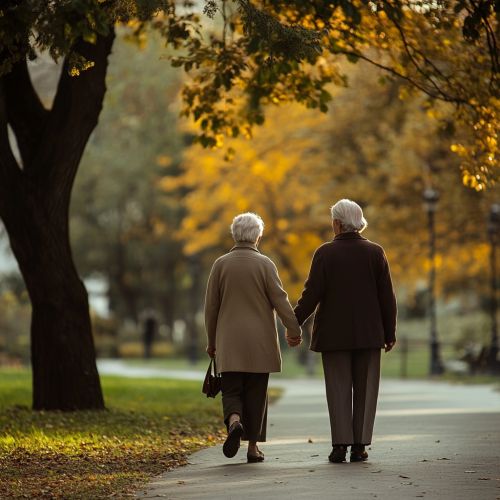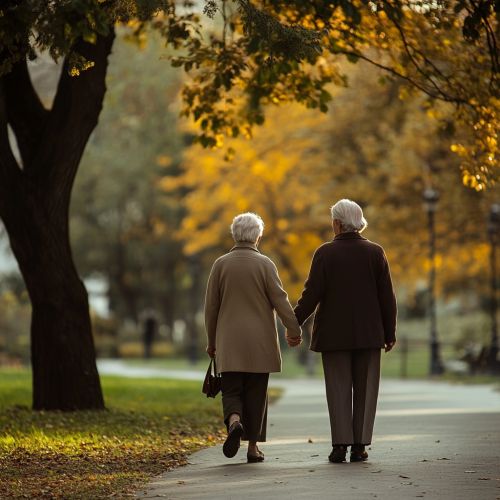Social Relationships and Aging: Difference between revisions
(Created page with "== Introduction == Social relationships and aging is a multifaceted topic that encompasses the changes in social interactions, networks, and roles as individuals grow older. This article delves into the complexities of how aging affects social relationships and vice versa, examining the psychological, sociological, and physiological dimensions. == Theories of Social Relationships and Aging == Several theories have been proposed to explain the dynamics of social relatio...") |
No edit summary |
||
| Line 68: | Line 68: | ||
Social relationships are a critical component of aging, influencing both psychological and physical well-being. Understanding the complexities of social interactions in older adults can inform interventions and policies aimed at improving the quality of life for this population. By fostering strong, supportive relationships, society can help older adults age with dignity and fulfillment. | Social relationships are a critical component of aging, influencing both psychological and physical well-being. Understanding the complexities of social interactions in older adults can inform interventions and policies aimed at improving the quality of life for this population. By fostering strong, supportive relationships, society can help older adults age with dignity and fulfillment. | ||
[[Image:Detail-97615.jpg|thumb|center|An elderly couple walking hand in hand in a park.|class=only_on_mobile]] | |||
[[Image:Detail-97616.jpg|thumb|center|An elderly couple walking hand in hand in a park.|class=only_on_desktop]] | |||
== See Also == | == See Also == | ||
Latest revision as of 09:36, 14 August 2024
Introduction
Social relationships and aging is a multifaceted topic that encompasses the changes in social interactions, networks, and roles as individuals grow older. This article delves into the complexities of how aging affects social relationships and vice versa, examining the psychological, sociological, and physiological dimensions.
Theories of Social Relationships and Aging
Several theories have been proposed to explain the dynamics of social relationships in the context of aging. These theories provide a framework for understanding the changes and continuities in social interactions as people age.
Socioemotional Selectivity Theory
The socioemotional selectivity theory posits that as people age, they become more selective about their social networks. This selectivity is driven by a shift in time perspective, where older adults prioritize emotionally meaningful relationships over the pursuit of new social connections. This theory suggests that older adults derive greater satisfaction from their social interactions due to this selectivity.
Disengagement Theory
The disengagement theory suggests that aging involves a mutual withdrawal between the individual and society. According to this theory, it is natural and acceptable for older adults to disengage from social roles and relationships, which allows for a smoother transition to the end of life. However, this theory has been criticized for its deterministic view and lack of consideration for individual differences.
Activity Theory
The activity theory counters the disengagement theory by asserting that staying active and engaged in social roles leads to greater life satisfaction in older adults. This theory emphasizes the importance of maintaining social interactions and participating in meaningful activities to promote well-being in later life.
Changes in Social Networks
As individuals age, their social networks undergo significant changes. These changes can be influenced by various factors, including retirement, health status, and the loss of loved ones.
Shrinking Social Networks
Research indicates that social networks tend to shrink with age. This reduction in network size is often due to the loss of friends and family members, as well as a decreased ability or desire to form new relationships. Despite the shrinking size, the quality of remaining relationships often improves, with older adults focusing on close, supportive connections.
Role Transitions
Aging is accompanied by several role transitions that impact social relationships. Retirement, for instance, can lead to a loss of work-related social contacts but may also provide opportunities to strengthen family ties and engage in new social activities. Similarly, becoming a grandparent introduces new social roles and responsibilities.
Psychological and Emotional Aspects
The psychological and emotional aspects of social relationships play a crucial role in the aging process. Positive social interactions can enhance mental health, while social isolation can have detrimental effects.
Emotional Support
Emotional support from friends and family is vital for older adults. It provides a buffer against stress and contributes to psychological well-being. Studies have shown that older adults with strong emotional support networks experience lower levels of depression and anxiety.
Loneliness and Social Isolation
Loneliness and social isolation are significant concerns for older adults. Loneliness refers to the subjective feeling of being alone, while social isolation is an objective lack of social contacts. Both can lead to adverse health outcomes, including cognitive decline, cardiovascular disease, and increased mortality risk.
Health Implications
The quality and quantity of social relationships have profound implications for physical health in older adults.
Cardiovascular Health
Strong social relationships have been linked to better cardiovascular health. Social support can reduce stress and promote healthier lifestyle choices, such as regular physical activity and adherence to medical advice. Conversely, social isolation is associated with an increased risk of hypertension and heart disease.
Cognitive Function
Engaging in social activities can help maintain cognitive function in older adults. Social interactions stimulate the brain, promoting mental agility and reducing the risk of cognitive decline and dementia. Participation in intellectually stimulating social activities, such as group discussions and games, can be particularly beneficial.
Immune Function
Social relationships also influence immune function. Positive social interactions can boost the immune system, enhancing the body's ability to fight infections. In contrast, social isolation and chronic stress can weaken immune function, making older adults more susceptible to illnesses.
Cultural and Societal Influences
Cultural and societal factors play a significant role in shaping social relationships in older adults. These influences can vary widely across different societies and cultural contexts.
Cultural Norms
Cultural norms and values dictate the expectations and behaviors related to aging and social relationships. In collectivist cultures, such as those in East Asia, older adults are often highly respected and integrated into family and community life. In contrast, individualistic cultures, such as those in Western societies, may place more emphasis on independence, which can affect the social support available to older adults.
Societal Structures
Societal structures, including policies and programs, can facilitate or hinder social relationships in older adults. For example, community centers and senior programs can provide opportunities for social engagement, while ageist attitudes and discrimination can lead to social exclusion.
Interventions and Strategies
Various interventions and strategies can help enhance social relationships and mitigate the negative effects of social isolation in older adults.
Community Programs
Community programs that promote social engagement can significantly improve the quality of life for older adults. These programs may include social clubs, volunteer opportunities, and educational classes. By providing structured opportunities for interaction, community programs can help older adults build and maintain social networks.
Technology
Technology can also play a role in maintaining social relationships. Video calls, social media, and online communities can help older adults stay connected with friends and family, especially when face-to-face interactions are limited. However, it is essential to address the digital divide and ensure that older adults have access to and are comfortable using these technologies.
Mental Health Support
Providing mental health support is crucial for addressing loneliness and social isolation. Counseling, support groups, and therapy can help older adults cope with the emotional challenges associated with aging and enhance their social relationships.
Conclusion
Social relationships are a critical component of aging, influencing both psychological and physical well-being. Understanding the complexities of social interactions in older adults can inform interventions and policies aimed at improving the quality of life for this population. By fostering strong, supportive relationships, society can help older adults age with dignity and fulfillment.


